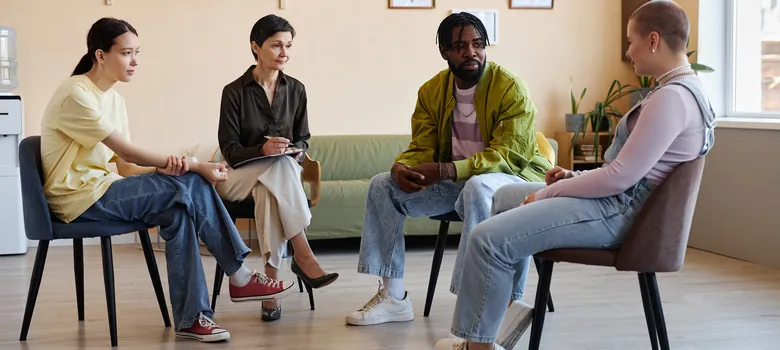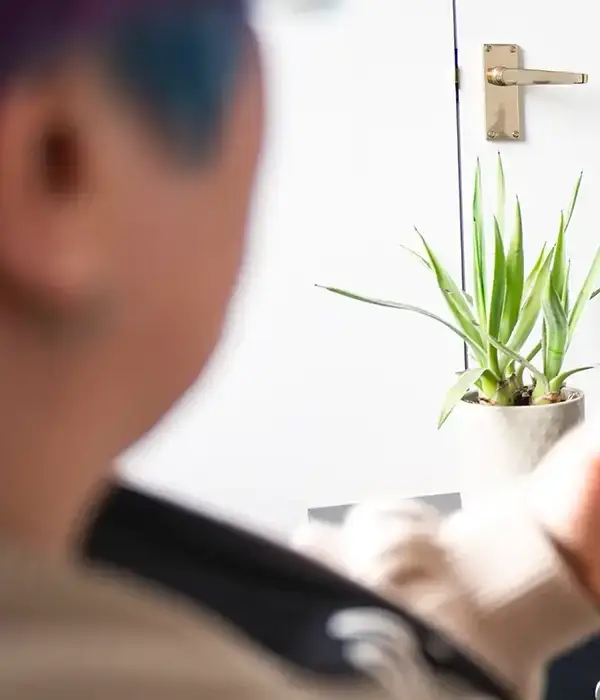Group Therapy
At Steps Together, we understand the strength that comes from connecting with others who face similar challenges. Group therapy creates a safe and supportive space where people can share openly, gain perspective, and build confidence in their recovery journey. As one of our core therapy modalities, it works alongside one-to-one counselling and other treatments for addiction and mental health, helping to create a complete pathway of care.
In these sessions, individuals not only benefit from professional guidance but also from the encouragement and insight of peers who understand what it feels like to go through similar struggles. This shared experience reduces isolation, builds trust, and fosters a sense of belonging that can make all the difference in long-term recovery.

Take Your Next Step with Group Therapy
We invite you to explore how group therapy can support your journey towards greater wellbeing. By joining guided group sessions, you’ll find a safe place to share experiences, learn from others, and build confidence in managing life’s challenges.

What is Group Therapy?
Group therapy brings people together in a safe, structured setting where they can share experiences, learn coping strategies, and receive professional guidance. It offers psychological support while also encouraging personal growth through interaction with others facing similar challenges.
How Group Therapy Works
In group therapy, a trained therapist leads a small number of people in regular sessions, usually held weekly. Sessions often take place in a circle, allowing everyone to see and engage with one another. This format encourages open discussion and builds trust among participants.
The therapist may guide conversations, introduce structured exercises, or encourage free-flowing dialogue depending on the group’s goals. Some groups focus on practical skills, such as managing anxiety or improving communication, while others provide space for emotional expression and reflection.
We find that group therapy works best when members feel safe to share, listen, and learn from each other. The group setting also allows us to observe real interactions, giving valuable insight into social behaviours and relationship patterns. Over time, this shared process helps individuals develop healthier ways of thinking, relating, and coping.


Who Is Group Therapy For?
Group therapy is suitable for people dealing with a wide range of difficulties, from depression and anxiety to substance use, grief, or long-term stress. It can also support those adjusting to major life changes, such as divorce or chronic illness.
We often recommend it for individuals who benefit from hearing different perspectives and knowing they are not alone in their struggles. Being part of mental wellbeing groups can reduce feelings of isolation and encourage a sense of belonging.
It is not always the right choice for someone in acute crisis, where one-to-one care may be more appropriate. However, for many, the combination of professional guidance and peer support creates a powerful environment for recovery and growth.
What to Expect in a Group Therapy Session
In group therapy, we meet with others facing similar challenges to share experiences, learn coping strategies, and practise healthier ways of relating. Sessions are guided by a trained therapist, but the group dynamic itself plays a central role in supporting progress and building confidence.
Process and Session Structure
A typical session begins with a brief check-in, where each member shares how they are feeling or what they would like to focus on. This opening helps set the tone and ensures everyone has a voice. The therapist then introduces themes or exercises tailored to the group’s needs, such as managing anxiety, coping with depression, or improving communication.
Discussions often flow naturally, with members encouraged to respond to each other rather than only to the therapist. This interaction builds trust and highlights group dynamics in therapy, which can be as valuable as the therapist’s input.
Sessions usually end with a short reflection or takeaway, allowing members to consolidate what they have learned and prepare for the week ahead. The structure provides both predictability and flexibility, helping us feel safe while leaving space for meaningful dialogue.
Therapist Qualifications and Training
Group therapy is always led by a qualified professional with specific training in psychotherapy. These therapists may come from backgrounds such as psychology, counselling, or social work, but they share a common expertise in guiding group dynamics and managing sensitive discussions.
Our therapists are trained to notice patterns in how members relate to one another. They use these observations to highlight connections between group behaviour and challenges outside the room, such as difficulties in relationships or struggles with confidence.
They also create a safe and respectful environment, balancing the needs of individuals while keeping the group’s progress on track. Their role is not only to provide guidance but also to encourage members to support and learn from each other.
Online vs In-Person Groups
Group therapy can take place either in person or online, each with its own advantages. In-person groups allow for more direct interaction, with body language and non-verbal cues adding depth to communication. Many people also find it easier to build a sense of connection face-to-face.
Online groups, however, increase accessibility for those who may struggle with travel, mobility, or scheduling. They also provide a comfortable option for individuals who feel anxious about attending sessions in person.
Both formats follow similar structures, with therapists ensuring that discussions remain engaging and inclusive. The choice often depends on personal preference, practical needs, and the type of group offered.
Types of Group Therapy
Group therapy can take many forms, depending on the goals of the participants and the approach of the therapist. Some groups focus on specific conditions, such as therapy for anxiety or depression, while others address broader issues like relationship patterns, self-esteem, or recovery from addiction.
Process groups emphasise open discussion and interaction, where members explore their thoughts and feelings in real time. Skills-based groups, often rooted in approaches like cognitive behavioural therapy (CBT), focus on practical strategies and structured exercises.
There are also psychoeducational groups, which combine teaching with discussion, helping members better understand their mental health and apply tools in daily life. Each type has its own rhythm and benefits, and therapists choose the format that aligns best with the group’s needs.
Confidentiality and Group Rules
Confidentiality is central to group therapy. We agree that what is shared in the room stays within the group, creating a foundation of trust. Without this commitment, members may feel hesitant to speak openly about personal experiences.
Groups also establish rules around respect, listening, and equal participation. For example, interrupting is discouraged, and everyone is encouraged to contribute without dominating the conversation. These guidelines ensure that all voices are heard.
The therapist reinforces these boundaries when needed, helping the group maintain safety and focus. Over time, these rules become part of the group culture, allowing members to take risks, share honestly, and feel supported in return.
Inclusive and Culturally Sensitive Groups
Inclusivity is a priority in group therapy. We recognise that members come from diverse backgrounds, cultures, and life experiences, and we aim to create a space where everyone feels acknowledged and respected.
Therapists are trained to be aware of cultural differences in communication, values, and perspectives on mental health. They encourage members to share their experiences without fear of judgement, and they remain mindful of how group dynamics may be influenced by these differences.
In practice, this means adapting language, examples, and exercises to reflect the diversity of the group. By doing so, we ensure that therapy feels relevant and accessible, allowing each member to engage fully and benefit from the process.
Other Therapy Modalities Available in Our Centres
We offer a range of additional therapies designed to support recovery from different angles. These approaches provide clients with more personalised care, helping them develop the tools and confidence needed for long-term wellbeing.
Dialectical Behaviour Therapy (DBT)
Dialectical Behaviour Therapy (DBT)
Key Benefits of Group Therapy
We gain more than just professional guidance in a group setting. Shared insight, mutual responsibility, and practical skills make this approach a valuable option for many people seeking structured mental health support.

Building Communication Skills
Group therapy gives us a safe place to practise how we communicate. Unlike individual sessions, we interact with several people at once, which mirrors real-life conversations.

Peer Accountability
When we commit to change in front of others, we feel more motivated to follow through. Knowing that peers are aware of our goals adds a layer of responsibility.

Cost-Effectiveness
In the UK, therapy can be expensive, and not everyone can afford frequent one-to-one sessions. Group therapy offers a more accessible option without reducing quality.

Supportive Peer Network
A group setting creates a network of people who understand our struggles. Unlike casual conversations with friends, these connections are built around shared therapeutic goals.

Increased Perspective
Hearing different viewpoints helps us see our challenges in new ways. In a group, each person brings their own background and coping strategies.

Group Therapy at Steps Together
At Steps Together, group therapy plays a central role in helping people build connection, practise new skills, and gain perspective from peers. We combine it with other therapeutic approaches and provide structured aftercare to ensure progress continues beyond the initial programme.
Integration with Other Therapy Modalities
We design our group therapy programmes to work alongside one-to-one sessions, ensuring each person receives both personal attention and collective support. This balance allows private exploration of sensitive issues while also benefiting from shared experiences in a safe group setting.
Our therapists often integrate evidence-based approaches such as DBT group therapy, which focuses on skills like emotional regulation and distress tolerance. These structured sessions give people practical tools they can apply immediately in daily life.
By blending individual therapy with group work, clients can process personal challenges privately, then practise communication and coping strategies in a supportive group environment. This integration creates a stronger foundation for long-term recovery and resilience.


Aftercare and Continuing Support
Recovery does not end when a structured programme finishes, so we place strong emphasis on aftercare. Our continuing support includes ongoing group sessions where clients can maintain accountability and strengthen the skills they developed during treatment.
These groups provide a consistent space to share progress, setbacks, and strategies for managing daily challenges. They also help reduce feelings of isolation, which is a common risk during the transition back into everyday routines.
Alongside group sessions, we encourage regular check-ins and access to additional therapies when needed. This layered approach ensures that support remains flexible, practical, and responsive to each person’s long-term needs.
Specialist Group Therapy Options
We provide structured group therapy programmes designed to address specific needs, offering safe environments where individuals can share experiences, build coping strategies, and develop stronger support networks. These options focus on targeted treatment approaches that combine professional guidance with peer understanding.
Our mental health treatment programmes bring people together in carefully facilitated groups to work through challenges such as anxiety, depression, and stress-related conditions. Each session encourages open discussion while also teaching practical skills that help participants manage daily life more effectively.
We combine therapeutic techniques with peer support, allowing members to learn from one another in a structured setting. Group work often complements private therapy sessions, giving individuals the chance to practise communication and coping strategies in real time.
By focusing on shared experiences, participants gain reassurance that they are not alone in their struggles. This approach not only reduces feelings of isolation but also strengthens motivation to engage with recovery.
Our outpatient support services provide flexible group therapy options that fit around existing commitments. These sessions are ideal for people who do not require residential care but still benefit from structured therapeutic support.
We deliver weekly or more frequent groups where members explore coping strategies, emotional regulation, and relationship skills. The outpatient model ensures continuity of care while allowing individuals to remain at home, work, or study.
This approach is particularly effective for those seeking ongoing support after completing a more intensive programme. It also offers a cost-effective alternative to private therapy sessions while maintaining professional guidance.
For individuals facing both mental health issues and substance use challenges, our dual diagnosis groups provide integrated support. These sessions recognise the strong link between mental health conditions and addictive behaviours, addressing both together rather than in isolation.
Participants work with trained therapists and peers who understand the complexity of managing co-occurring disorders. Group work creates a supportive environment where members can share strategies for maintaining sobriety while also improving emotional wellbeing.
By combining therapeutic interventions with peer encouragement, we help individuals build resilience and long-term recovery skills. This specialist approach ensures that both aspects of dual diagnosis are treated with equal importance.
Practical Considerations for Joining a Group
We need to think carefully about whether group therapy fits our needs, how we access a place, and what it will cost us. Different routes exist through public and private services, and practical details like timing and frequency also shape the experience.
Eligibility and Suitability
Not everyone will benefit equally from a group setting, so assessing suitability matters. We usually start with a consultation where a therapist explores our goals, background, and current challenges. This helps determine whether we can engage safely and productively with others.
Some groups are designed for specific issues, such as anxiety, trauma, or addiction. Others are broader and focus on building communication or emotional resilience. Matching our needs with the right group increases the likelihood of progress.
We should also consider our readiness to listen to others, share personal experiences, and accept feedback. Group therapy requires a willingness to engage openly, though we can set our own pace. If we prefer one-to-one support or struggle with group settings, individual therapy may be more suitable.
Costs and Insurance Options
Costs vary depending on whether we join through the NHS or privately. NHS groups are free at the point of access, but waiting times can be long. Private sessions usually range from £30 to £60 per session, though specialist groups may charge more.
Some private health insurance policies cover group therapy, but coverage differs between providers. We should check whether our plan includes group-based treatment, as many focus primarily on individual therapy.
If we pay out of pocket, some clinics offer reduced rates for block bookings or concessionary fees. Asking about payment options early helps us plan realistically for ongoing attendance.
Session Duration and Frequency
Group therapy sessions usually last between 90 minutes and two hours. This allows enough time for everyone to contribute without the session becoming overwhelming. The structure typically includes a check-in, discussion, and reflection period.
Most groups meet once a week at the same time and place. Regular attendance is important because it builds trust and continuity. Missing sessions can disrupt the flow and affect both our progress and the group dynamic.
Some programmes run for a set number of weeks, while others are ongoing. Knowing the expected duration helps us prepare for the level of commitment required.
Referral and Booking Process
Accessing a group often begins with a referral. In the NHS, this usually comes through a GP, local mental health team, or an initial assessment service. We may need to wait for a place to become available, as demand can be high.
In private practice, we can usually self-refer. This involves contacting a clinic directly, completing an enquiry form, and attending a consultation with a therapist. The process is often quicker, though availability depends on the provider.
Once accepted, we are introduced to the group leader and given information about start dates and expectations. Some providers ask us to commit to a minimum number of sessions to ensure stability for the group.
NHS vs Private Access
The NHS offers structured group therapy programmes, but spaces are limited. We may need to wait several weeks or months before joining. Groups are often focused on common mental health concerns, such as depression or social anxiety.
Private options give us more flexibility. We can usually choose between different formats, such as open-ended or time-limited groups, and start sooner. Sessions may also be tailored to specific themes or therapeutic approaches.
Choosing between NHS and private care often comes down to balancing cost, waiting time, and the type of support we want. Both routes provide professional guidance, but the experience can differ significantly.

Begin Your Journey with Steps Together
We believe that healing begins when we take the first step side by side. Group therapy offers a space where we can share experiences, learn from one another, and build connections that remind us we are not alone.
By joining together, we create a supportive environment that encourages openness and growth. Each session gives us the chance to practise new skills, gain perspective, and develop healthier ways of relating to ourselves and others.
Let’s take these steps together. When we commit to the process, we give ourselves the opportunity to move forward with greater strength, clarity, and confidence in the path ahead.
Frequently Asked Questions about Group Therapy
Group therapy brings people together in a structured setting to discuss shared challenges, learn coping strategies, and receive support from both peers and a trained facilitator. Sessions are guided, confidential, and tailored to specific needs such as mental health conditions, recovery, or personal growth.
Who can join a group therapy session?
We welcome people who want support in managing mental health difficulties, addiction, relationship challenges, or life transitions. Groups are usually formed around shared experiences so that participants can relate to one another.
Some groups are open to anyone seeking support, while others require a referral or assessment to ensure the fit is right. Online therapy groups also make access easier for those unable to attend in person.
How long does a session last and how often are they held?
Sessions usually last between 60 and 90 minutes. This gives enough time for meaningful discussion without becoming too tiring.
Groups often meet once a week, though some programmes run more frequently depending on the needs of participants. Online therapy groups may offer shorter sessions but meet more often, providing flexibility for those with busy schedules.
What if I feel uncomfortable sharing in a group?
It is normal to feel nervous about speaking in front of others. We encourage participation but no one is forced to share more than they feel ready to.
Listening can be just as valuable as speaking. Over time, many people find that their confidence grows and they begin to share more openly at their own pace.
Can I access group therapy through the NHS or insurance cover?
Yes, group therapy is available through the NHS, particularly for common conditions such as depression, anxiety, and addiction. Access usually requires a referral from a GP or mental health professional.
Private health insurance may also cover group therapy, depending on the policy. We recommend checking with your provider to understand what sessions are included and whether online therapy groups are covered.
Can I attend both group and individual therapy at the same time?
Yes, many people benefit from combining both approaches. Individual therapy allows for private exploration of sensitive issues, while group therapy offers shared support and feedback from peers.
Using both can strengthen progress, as what we learn in one setting can often be applied in the other. Therapists may recommend a combination depending on personal needs.
How many people are usually in a group?
Most groups include between 6 and 12 participants. This size allows everyone the chance to contribute without feeling overwhelmed.
Smaller groups create a more intimate environment, while slightly larger ones bring a wider range of perspectives. The therapist will usually monitor group size to maintain balance and ensure discussions remain manageable and supportive.
What issues does group therapy help with?
Group therapy supports a wide range of difficulties. Common areas include anxiety, depression, substance misuse, trauma recovery, and relationship struggles.
It is also effective for building social skills, increasing self-awareness, and reducing feelings of isolation. By hearing others’ experiences, we often gain new insights into our own challenges and learn practical ways to cope.
How much does group therapy cost in the UK?
Costs vary depending on whether sessions are private or NHS-funded. Private therapy groups in the UK often range from £20 to £60 per session, with some specialist groups charging more.
Some organisations offer reduced fees or sliding scales based on income. Online therapy groups may also be more affordable, reducing travel costs and offering flexible pricing.
Who leads the sessions and are they qualified?
Sessions are led by trained professionals such as psychologists, psychotherapists, or counsellors. They are responsible for guiding discussions, ensuring confidentiality, and creating a safe environment.
Facilitators often have specialist training in group dynamics and mental health. Their role is not just to manage conversations but also to provide therapeutic input and keep the group focused on its goals.






